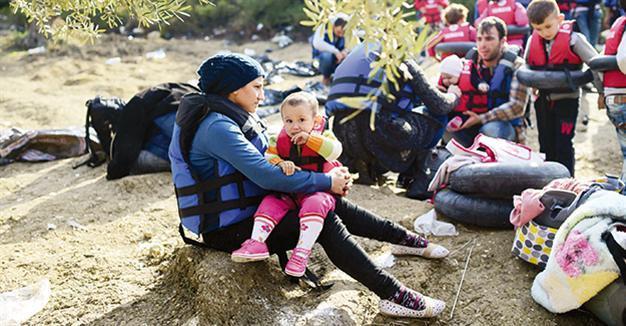Turkey, EU to meet over critical refugee crisis
Serkan Demirtaş - ANKARA

A Syrian migrant woman holds a baby wearing a life-jackets before boarding a dinghy to cross the Aegean Sea to the Greek island of Lesbos from the Ayvacik coast in Canakkale on February 28, 2016. The number of asylum-seekers entering Greece from Turkey continues unabated and the border closures along the Balkan route "are creating a difficult situation in Greece," UN Secretary-General Ban Ki-moon saif on February 26, 2016. Close to 120,000 migrants have already arrived in Europe so far this year
Turkey and the EU are set to come together at a summit on March 7 in Brussels as part of ongoing efforts to implement a joint action plan on illegal migrants with both sides expected to voice expectations from each other.While European leaders will push Turkey to agree to “large-scale” deportations of economic migrants from Greece in order to reduce the huge of flow of migrants into the EU, the Turkish government will ask EU to fulfill its commitments on visa liberalization and re-energizing stalled accession talks outlined at an earlier summit held late November 2015.
The summit will bring Turkish Prime Minister Ahmet Davutoğlu together with leaders from 28 EU leaders including German Chancellor Angela Merkel, French President François Hollande and British Prime Minister David Cameron. Davutoğlu was scheduled to have meetings with Merkel and EU term president Dutch Prime Minister Mark Rutte yesterday. He will meet with Greek Prime Minister Alexis Tsipras early March 7. EU leaders will hold another meeting on their own after Turkey-EU Summit, which will release a joint statement.
Donald Tusk, the European Council president and summit host, said in his invitation letter that success depended largely on securing Turkey’s agreement at the summit for the “large-scale” readmission from Greece of economic migrants who do not qualify as refugees. Syrians, who top the influx of people into Europe, are considered genuine refugees requiring admission under international law. “For the first time since the beginning of the migration crisis, I can see a European consensus emerging,” Tusk said in his letter.
Dutch Prime Minister Rutte told reporters he hoped Turkey would agree “to accelerate readmission of third country nationals and economic migrants.” Rutte added, “I think that would be the minimum outcome.”
The European Commission report that was released last week urged Ankara to “swiftly negotiate and conclude readmission agreements with the relevant third countries,” which would then take back economic migrants from Turkey. In return, Rutte said, Europe could implement a more “ambitious” plan to resettle refugees directly from camps in Turkey, which hosts 2.7 million Syrian refugees.
Davutoğlu to present ways to stop illegal migrant flow
A senior Turkish official speaking to the Hürriyet Daily News said Davutoğlu will make a comprehensive presentation to inform EU leaders on the steps Turkey has taken to stop illegal flow of migrants. “He will detail security measures we have taken as well as reforms we have realized in line with the joint action plan. The joint action plan is functioning very well and the EU Commission’s recent report shows it,” the official said, referring the report that says the number of illegal migrants reaching Greek islands from Turkey has shown a decrease in recent months.
The summit will constitute another opportunity for Turkey to voice its expectations from the EU on key issues. One of the first issues is the transfer of three billion euros the EU had promised to Turkey in its efforts to meet vital needs of the nearly three million Syrian refugees sheltered on its soil. Apart from securing visa-free travel right to its citizens by October, Turkey also wants to re-energize accession talks through opening more chapters this year.
Although Turkey has long ago submitted the projects on which the EU fund will be spent, Brussels has not yet transferred the money to Turkey. EU officials have said 95 million Euros of this budget has been delivered to Turkey but Foreign Minister Mevlüt Çavuşoğlu denied this late March 5.
Another vague issue is how many refugees EU countries will accept legally from Turkey. The resettlement of Syrian and Iraqi refugees constitute one of the most important measures to stop the illegal migration from Turkey into Europe.
The deal clinched in November 2015 also envisages visa-free travel for Turkish citizens to Schengen countries. The Turkish government will likely underline that it has almost fulfilled the 72 benchmarks required by the EU and therefore will ask Brussels for a more concrete commitment on the implementation of the process.
Re-energizing accession talks through opening chapters is also an issue Turkey demands from the EU. A letter signed and sent to the Turkish government by Tusk promises the completion of preparatory works for the opening of five chapters in the first quarter of 2016. EU officials say preparatory works for the chapter 24 on justice, freedom and security are well advanced.
















